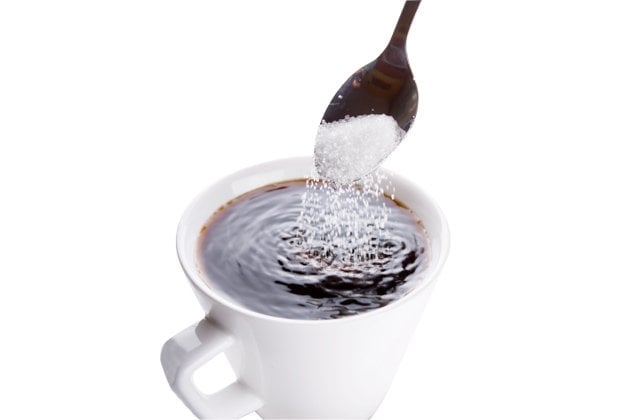
What’s a diet soda lover to do? Or a coffee junkie with a sweet tooth?
There’s been so much noise about the dangers of artificial sweeteners lately that people watching their calories and blood sugar have their heads spinning.
Coca-Cola even took out ads declaring that aspartame’s safety “is supported by more than 200 studies over the last 40 years.” Yes and no.
How do we make sense of the conflicting data?
What the experts say
“The only sweetener that caused any cancer was saccharine, and that was specific to male rats. Aspartame definitely doesn’t cause cancer, and the data so far looks good for sucralose (Splenda). The experiments that found a link between cancer and aspartame and sucralose have been examined by regulatory agencies and scientists all over the world. They were not well designed experiments, and the authors have refused to disclose important details. Aspartame is the safest. I know exactly how it’s metabolized – it’s turned into stuff your body encounters every day.”
ERIC WALTERS, College of Pharmacy, Rosalind Franklin University of Medicine and Science, author, The Sweetener Book, Chicago, Illinois
“Aspartame has caused cancer in three independent studies and in our opinion should not be on the market. The lab conducting the studies has been criticized we have looked at those criticisms, and the vast majority are without merit. We’re seeing tumours in two different animal species, at multiple sites. The results are very compelling. We tell people to be cautious about sucralose. Acesulfame K is another we recommend consumers avoid. The best choice is to cut back on both sugar and artificial sweetener intake. Drink seltzer. Put a little juice in the seltzer, or in your water.”
LISA LEFFERTS, senior scientist, Center for Science in the Public Interest, Washington, DC
“Our paper discussed human studies that assess the risk of diseases in people who drank one diet soda per day compared to those who did not. Those studies indicated that risks for stroke, heart disease and type 2 diabetes were higher in diet soda drinkers, even when family history, dietary intake and body weight were considered. The paper also talked about data that demonstrated that animals given artificially sweetened diets gain excess weight and show difficulties in regulating blood sugar. The data suggest that over the long term, consuming even one diet soda a day may contribute to risks of negative outcomes. Normally, a sweet taste in the mouth means sugar and energy is going to enter the digestive system, and the body releases hormones like insulin and GLP-1 in preparation. Artificial sweeteners cause confusion since they are not followed by energy or sugar. As a result, the anticipatory responses get smaller, since the body cannot predict whether calories and sugar will arrive. Over time, this could contribute to overeating and poorer regulation of blood sugar levels.”
SUSAN SWITHERS, College of Health and Human Sciences, Purdue University, West Lafayette, Indiana
“A number of major reviews show there is nothing toxic in any diet sweetener. Recent studies by two groups – the Harvard one and ours, both with major cohorts – showed that all the adverse effects on weight or cardio metabolic problems linked with diet sweeteners were found because half the people who use diet sweeteners consume a very poor diet. The lingering issue is if diet sweetener use increases desire for other sweeteners, but there is no evidence of this to date.”
BARRY POPKIN, department of nutrition, University of North Carolina Gillings School of Public Health, Chapel Hill
“Aspartame is the one I would caution against most, more than sucralose. Studies on stevia look like it has potentially helpful effects, but it hasn’t been well studied. [Still], if I were to pick a sweetener, I would pick stevia. The sugar or honey in your coffee or tea, unless you’re overdoing it, is not the problem. It’s not going to cause obesity or diabetes in most people, even if you’re using it every day. If you’re eating sugar in the form of candy bars, more harm is done. It’s about limiting the sugar you’re using. You don’t have to stop cold turkey.”
DAVID DENIS, naturopath, Toronto
“We have found that mice, when given a choice between very sweet artificial sweetener and less sweet sugar solutions, will eagerly choose the former. However, in a state of hunger, the same mice will develop a very strong attraction for the sugar solutions, to the point of ignoring the non-caloric ones. Cells in the brain that produce the neurotransmitter dopamine do not respond to sweet solutions unless they contain calories from sugars. Dopamine is a chemical signal fundamental for sensations and actions associated with rewards. Thus, brain cells involved in reward and feeding habits seem more interested in how energetic sweet solutions are rather than how sweet or aromatic they may otherwise be.”
IVAN DE ARAUJO, Yale University School of Medicine, New Haven, Connecticut
Got a question?
Send your Althealth queries to
althealth@nowtoronto.com












